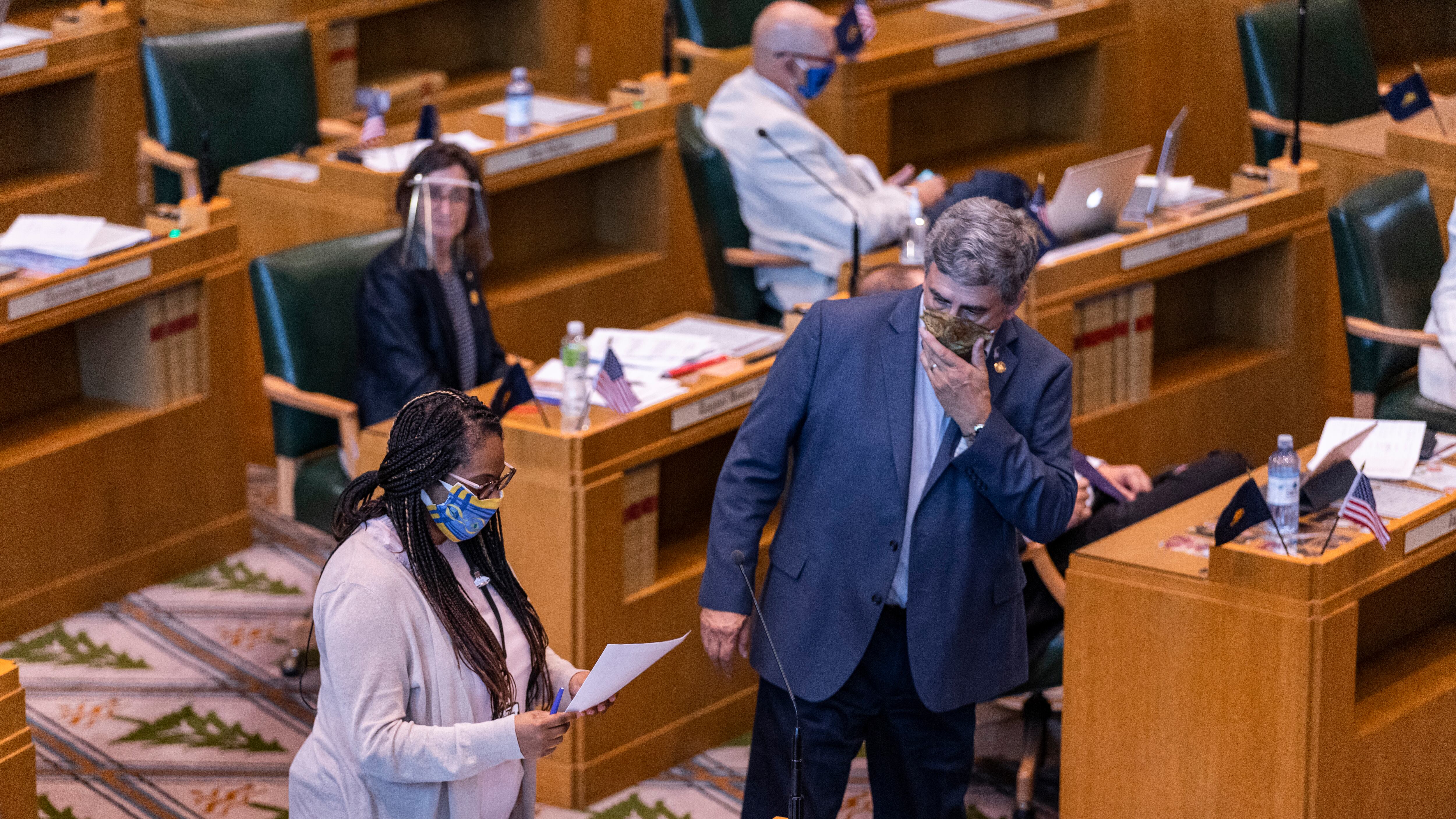House Speaker Tina Kotek (D-Portland) has survived the first real challenge to her authority since she became speaker in 2013.
This morning, state Rep. Janelle Bynum (D-Clackamas) said she would not pursue a floor challenge to Kotek on Jan. 11 when the Legislature convenes.
Bynum said she'd come to the realization that her quest to unseat the longest-serving speaker in Oregon history would fall short and that she would therefore avert a divisive floor vote.
"My fervent hope is to lead the Oregon House of Representatives as speaker, and I look forward to the day in the near future where Oregon state representatives are able to vote with pride and unity to elect me to lead the chamber," Bynum said in a statement. "Until that day comes, I will continue to lead with dignity, a sense of fairness, an eye for our collective economic prosperity, and a deep, unbridled love for the children of this state."
On Twitter, she was more explicit: "I'm ending my current bid for House speaker," she wrote.
That announcement brings to an end a rarity in recent Oregon politics: a serious attempt to unseat one of the long-serving leaders who dominate the Capitol. (Senate President Peter Courtney, D-Salem, has held his leadership position since 2003.)
Although Bynum launched her candidacy for speaker at a time when racial equity has never been a bigger issue in Oregon, Kotek enjoyed strong support from a wide variety of key interest groups, most notably the state's largest public employee unions, which would not have viewed defections from her caucus kindly. Kotek also used her position skillfully to retain power.
Democrats control the House 37 to 23. To be successful, Bynum's challenge to Kotek would have required her to stitch together a coalition of House Republicans—several of whom oppose Bynum's aggressive police reform policies—with disaffected Democrats. There are some Democrats who chafe at Kotek's leadership because they consider her too liberal; others find her imperious and have grumbled about her treatment of state Reps. Diego Hernandez (D-East Portland) and David Gomberg (D-Otis) after women raised concerns about both men.
Last week, Kotek announced committee assignments at a time when few people were likely to pay attention—at 5.25 pm on New Year's Eve—using one of the powers of the speakership to cement alliances and soothe hurt feelings.
The assignments included a big change: The number of committees increased from 32 in 2019 to 38 for 2021. That means there are more of the most coveted items in Salem—committee chair gavels—that Kotek can distribute.
Notably, she made Gomberg co-vice chair of the budget-writing Joint Ways and Means Committee and made him co-chair of the Ways and Means Subcommittee on Transportation and Economic Development. She also assigned Hernandez to two committees, after urging him to resign last year. And she assigned state Rep. Mark Meek (D-Milwaukie), a critic, to co-chair a new committee on modernizing the Legislature.
Kotek also retained Bynum as chair of the House Judiciary Committee, a plum assignment that will allow Bynum to direct legislation on police reform and equity issues. Kotek kept the Republican most likely to support her continued leadership, state Rep. Greg Smith (R-Heppner), in power, assigning him to be co-vice chair of the Joint Ways and Means Committee and co-chair of the Ways and Means Subcommittee on General Government (he's the only House Republican who leads or co-leads a committee).
In a joint statement Monday morning that made no direct mention of Bynum's challenge, Kotek and House Majority Leader Barbara Smith Warner (D-Portland) said they would take a number of steps to address concerns from Black, indigenous and people of color (BIPOC) members that the House has not operated or shared power equitably. Those concerns were at the heart of Bynum's challenge.
The leaders said they would take a number of concrete steps, including creating "dedicated space" for BIPOC members on the House leadership team; launching a committee to encourage more equitable participation and engagement in the legislative process; provide staff for BIPOC caucuses; provide translation service for constituents; and prioritize BIPOC Oregonians when making policy decisions involving the pandemic, wildfires and the recession.
They also singled Bynum out for praise: "Our colleague, Rep. Janelle Bynum, has been a leading voice in the Legislature for confronting and dismantling the structural legacies that have kept BIPOC Oregonians out of positions of power and influence," the leaders said. "For years, Rep. Bynum has refused to accept the status quo systems of power in the state. We appreciate and support Rep. Bynum's ongoing leadership. She—along with other members of the BIPOC Caucus and other community leaders—has continually pointed out structural problems big and small that conspire to exclude diverse voices in the Legislature."
Kotek and Warner promised, in future, things would be different:
"We are committed to confronting the past while taking steps to build a future that is more truly equitable—one that centers the needs of people who have been oppressed, discriminated against, and kept out of the halls of influence for too long."
